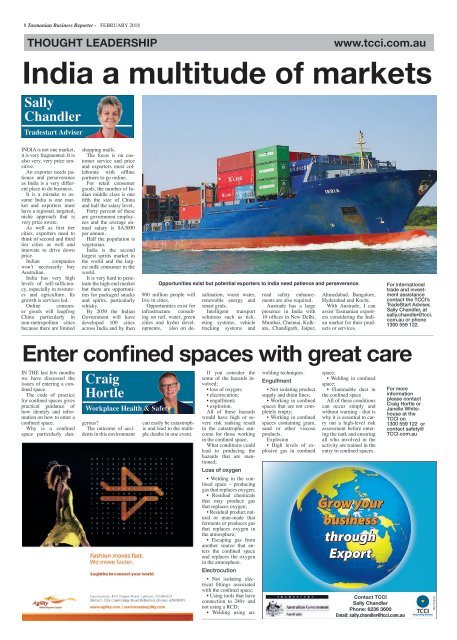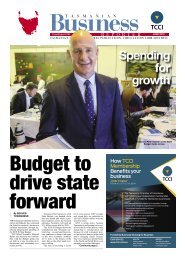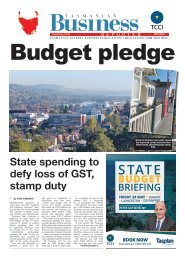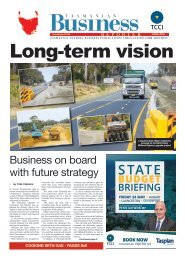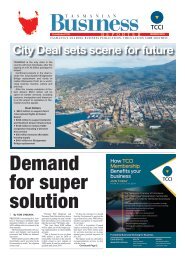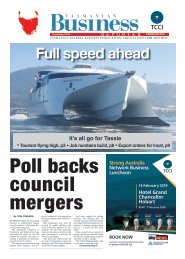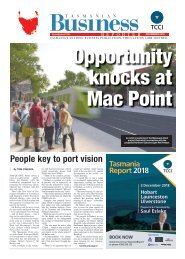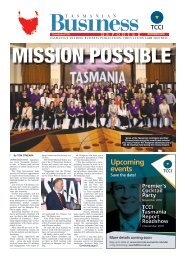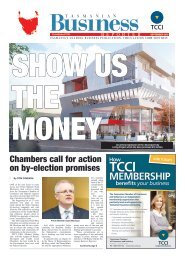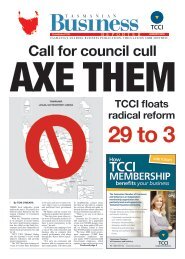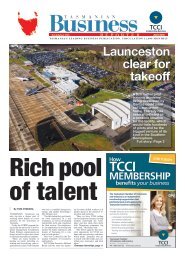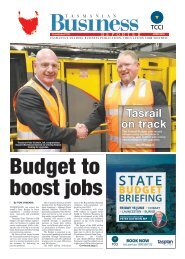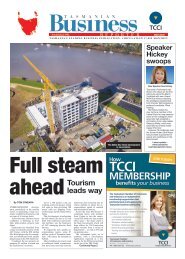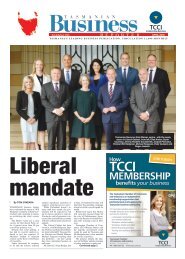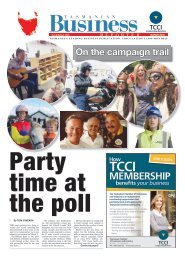Tasmanian Business Reporter February 2018
This month, in the lead up to the March 3 election, Editor Tom O'Meara stresses how important a majority government is to the Tasmanian business community. As usual, you'll also find the latest in business news from around the state. Please note, the March edition of the TBR will be published early, so any editorial submissions, appointments and announcements need to be sent to TBReditorial@fontpr.com.au by Monday, 12 February.
This month, in the lead up to the March 3 election, Editor Tom O'Meara stresses how important a majority government is to the Tasmanian business community.
As usual, you'll also find the latest in business news from around the state.
Please note, the March edition of the TBR will be published early, so any editorial submissions, appointments and announcements need to be sent to TBReditorial@fontpr.com.au by Monday, 12 February.
You also want an ePaper? Increase the reach of your titles
YUMPU automatically turns print PDFs into web optimized ePapers that Google loves.
8 <strong>Tasmanian</strong> <strong>Business</strong> <strong>Reporter</strong> - FEBRUARY <strong>2018</strong><br />
THOUGHT LEADERSHIP<br />
www.tcci.com.au<br />
India a multitude of markets<br />
Sally<br />
Chandler<br />
Tradestart Adviser<br />
INDIA is not one market,<br />
it is very fragmented. It is<br />
also very, very price sensitive.<br />
An exporter needs patience<br />
and perseverance<br />
as India is a very different<br />
place to do business.<br />
It is a mistake to assume<br />
India is one market<br />
and exporters must<br />
have a regional, targeted,<br />
niche approach that is<br />
very price aware.<br />
As well as first tier<br />
cities, exporters need to<br />
think of second and third<br />
tier cities as well and<br />
innovate to drive down<br />
price.<br />
Indian companies<br />
won’t necessarily buy<br />
Australian.<br />
India has very high<br />
levels of self-sufficiency,<br />
especially in resources<br />
and agriculture. Its<br />
growth is services led.<br />
Online consumer<br />
goods will leapfrog<br />
China particularly in<br />
non-metropolitan cities<br />
because there are limited<br />
shopping malls.<br />
The focus is on customer<br />
service and price<br />
and exporters must collaborate<br />
with offline<br />
partners to go online.<br />
For retail consumer<br />
goods, the number of Indian<br />
middle class is one<br />
fifth the size of China<br />
and half the salary level.<br />
Forty percent of these<br />
are government employees<br />
and the average annual<br />
salary is $A3000<br />
per annum.<br />
Half the population is<br />
vegetarian.<br />
India is the second<br />
largest spirits market in<br />
the world and the largest<br />
milk consumer in the<br />
world.<br />
It is very hard to penetrate<br />
the high-end market<br />
but there are opportunities<br />
for packaged snacks<br />
and spirits, particularly<br />
whisky.<br />
By 2050 the Indian<br />
Government will have<br />
developed 100 cities<br />
across India and by then<br />
Opportunities exist but potential exporters to India need patience and perseverance.<br />
900 million people will<br />
live in cities.<br />
Opportunities exist for<br />
infrastructure consulting<br />
on rail, water, green<br />
cities and hydro developments,<br />
also on desalination,<br />
waste water,<br />
renewable energy and<br />
smart grids.<br />
Intelligent transport<br />
solutions such as ticketing<br />
systems, vehicle<br />
tracking systems and<br />
road safety enhancements<br />
are also required.<br />
Austrade has a large<br />
presence in India with<br />
10 offices in New Delhi,<br />
Mumbai, Chennai, Kolkata,<br />
Chandigarh, Jaipur,<br />
Ahmedabad, Bangalore,<br />
Hyderabad and Kochi.<br />
With Austrade, I can<br />
assist <strong>Tasmanian</strong> exporters<br />
considering the Indian<br />
market for their products<br />
or services.<br />
For international<br />
trade and investment<br />
assistance<br />
contact the TCCI’s<br />
TradeStart Adviser,<br />
Sally Chandler, at<br />
sally.chandler@tcci.<br />
com.au or phone<br />
1300 559 122.<br />
Enter confined spaces with great care<br />
Craig<br />
Hortle<br />
Workplace Health & Safety<br />
IN THE last few months<br />
we have discussed the<br />
issues of entering a confined<br />
space.<br />
The code of practice<br />
for confined spaces gives<br />
practical guidance of<br />
how identify and information<br />
on how to enter a<br />
confined space.<br />
Why is a confined<br />
space particularly dangerous?<br />
The outcome of accidents<br />
in this environment<br />
can easily be catastrophic<br />
and lead to the multiple<br />
deaths in one event.<br />
If you consider the<br />
some of the hazards involved;<br />
• loss of oxygen;<br />
• electrocution;<br />
• engulfment;<br />
• explosion.<br />
All of these hazards<br />
would have high or severe<br />
risk ranking result<br />
in the catastrophic outcome<br />
for those working<br />
in the confined space.<br />
What conditions could<br />
lead to producing the<br />
hazards that are mentioned;<br />
Loss of oxygen<br />
• Welding in the confined<br />
space – producing<br />
gas that replaces oxygen;<br />
• Residual chemicals<br />
that may produce gas<br />
that replaces oxygen;<br />
• Residual product natural<br />
or man-made that<br />
ferments or produces gas<br />
that replaces oxygen in<br />
the atmosphere;<br />
• Escaping gas from<br />
another source that enters<br />
the confined space<br />
and replaces the oxygen<br />
in the atmosphere.<br />
Electrocution<br />
• Not isolating electrical<br />
fittings associated<br />
with the confined space;<br />
• Using tools that have<br />
connection to 240v and<br />
not using a RCD;<br />
• Welding using arc<br />
welding techniques.<br />
Engulfment<br />
• Not isolating product<br />
supply and drain lines;<br />
• Working in confined<br />
spaces that are not completely<br />
empty;<br />
• Working in confined<br />
spaces containing grain,<br />
sand or other viscose<br />
products.<br />
Explosion<br />
• High levels of explosive<br />
gas in confined<br />
space;<br />
• Welding in confined<br />
space;<br />
• Flammable dust in<br />
the confined space<br />
All of these conditions<br />
can occur simply and<br />
without warning - that is<br />
why it is essential to carry<br />
out a high-level risk<br />
assessment before entering<br />
the tank and ensuring<br />
all who involved in the<br />
activity are trained in the<br />
entry to confined spaces.<br />
For more<br />
information<br />
please contact<br />
Craig Hortle or<br />
Janelle Whitehouse<br />
at the<br />
TCCI on<br />
1300 559 122 or<br />
contact safety@<br />
TCCI.com.au


